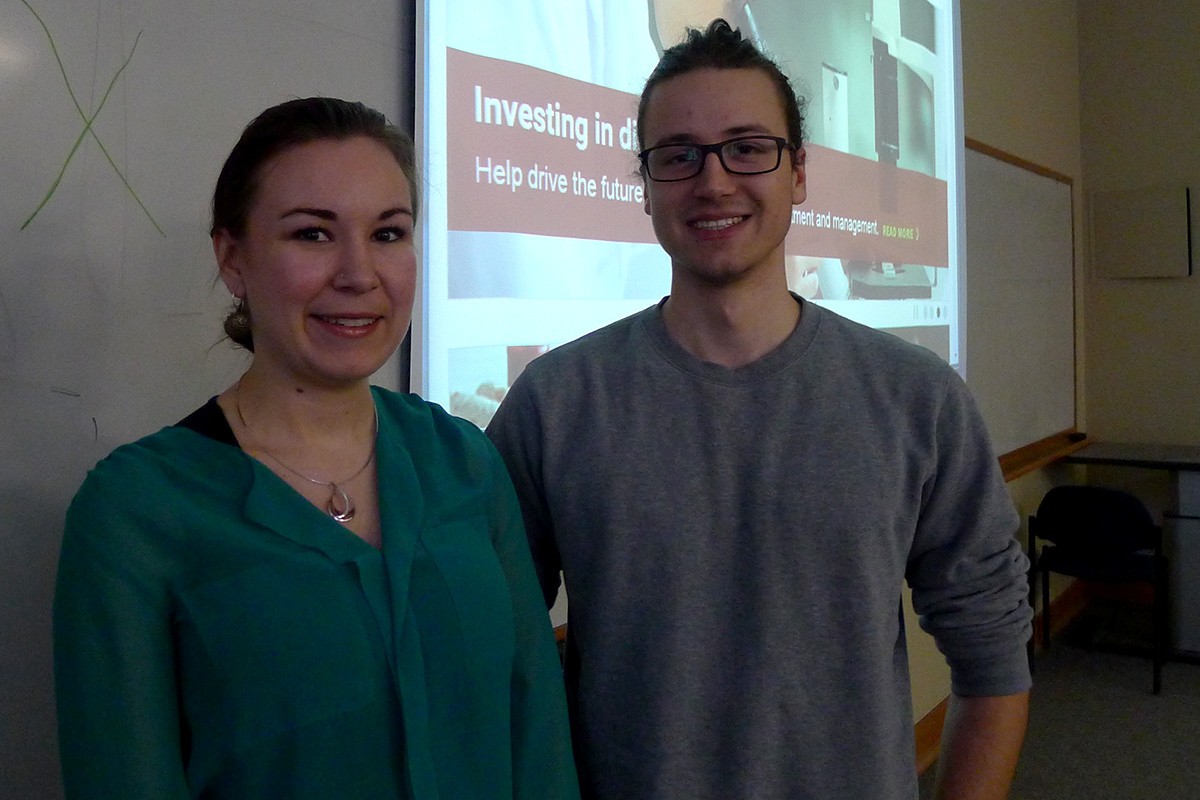
Laryssa Sawchuk from the Canadian Diabetes Association (left) and Gavin Pinniger, whose essay won the social psychology essay contest.
Contest uncovers ‘eye-opening’ number of students volunteering to aid community groups
Professor Dan Bailis, head of the psychology department, recently introduced an essay contest in which students’ wide experiences in volunteering formed the launching pad for a social psychology assignment.
“I’ve tried to adopt a teaching style that’s sometimes called action teaching. It tries to not just engage students with the material—but also engage the material of the course with things that are going on in the world to actually make a difference,” said Bailis.
In this instance, that meant taking an essay assignment and transforming it into a way of raising funds for a volunteer organization. Students held a pledge drive, contributing a maximum of $2 per person, with amounts matched by Bailis. The total would go to whatever community group was the subject of a winning essay, with hundreds ultimately raised.
Drawing inspiration from work by Professor Scott Plous from Wesleyan University, Bailis asked students in a social psychology class to complete a survey, which asked if they had volunteered with a community group in the past year, and if so, to provide the name of the organization.
More than 40 per cent of students in the class of about 120 had volunteered their time in the past year. The list of groups where students had helped out spanned more than 30 organizations, including the likes of Klinic Community Health Crisis Phone Line, Siloam Mission, Rehabilitation Centre for Children and Winnipeg Harvest, among others.
“It was really interesting and eye opening because we had such a high number of students who volunteer,” said Bailis. “It surprised me and I think it surprised students to realize how much volunteer time and energy there is and how many organizations there are to support. It was quite a broad range.”
The next step involved students selecting one of the groups listed from the responses and writing an essay looking at connections between social psychology and how it helps, or potentially could assist, the community organization and its mandate.
“They really were writing a critical-thinking piece,” said Bailis.
Once students had written and submitted their papers, Bailis and a teaching assistant reviewed them and created a short list of essays.
The names of students were removed from papers before they were given to another faculty member who specializes in social psychology to evaluate and help select a winner for the essay contest.
Gavin Pinniger, a third-year student pursuing a general science degree, captured the win for his look at Camp Briardale, run by the Canadian Diabetes Association. The group provides encouragement and growth opportunities to children with Type 1 diabetes.
“I chose to write about Camp Briardale because a friend of mine volunteers there during the summer. She recently developed Type 1 diabetes,” said Gavin. “I thought the camp is of great value for kids and adults living with chronic illness.”
Dan Bailis said selecting a winning essay was not an easy choice, with papers covering several organizations.
“We had many outstanding essays,” he said, citing Gavin’s integration of social psychology concepts from the course with the operations of the camp as what led to its win.
In early April when Gavin’s winning essay was announced, Dan Bailis also had a Canadian Diabetes representative come to class to discuss Camp Briardale.
Bailis said he hopes this type of assignment also contributes to developing more social psychology literature examining volunteering and the “important helping roles” people pursue when volunteering with community organizations.
For Gavin Pinniger, the class assignment has spurred him to want to do more.
“Volunteering is very important,” he said “When you volunteer, you’re contributing your time and energy because you care, not for any monetary reward. I do not volunteer enough and I want to change that now.”
National Volunteer Week runs from April 10 – 16, 2016






